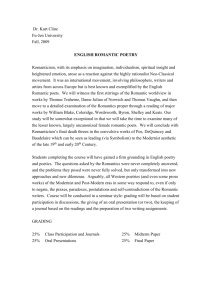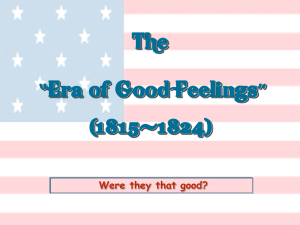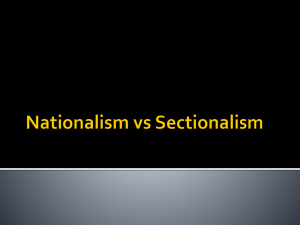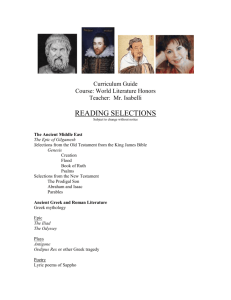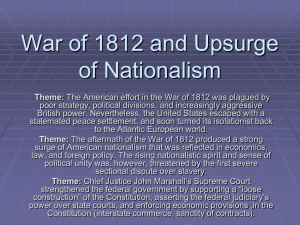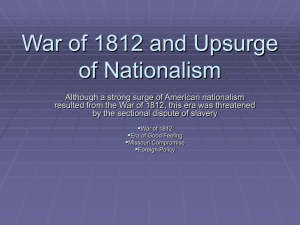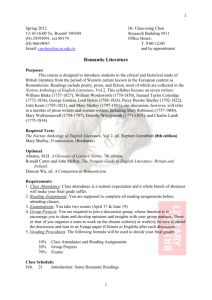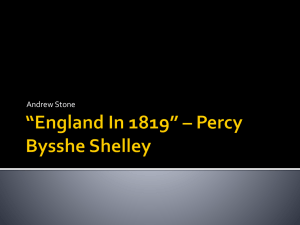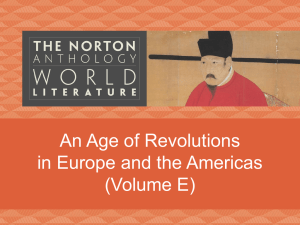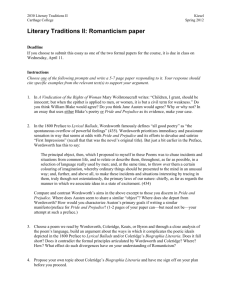Syllabus - WesFiles
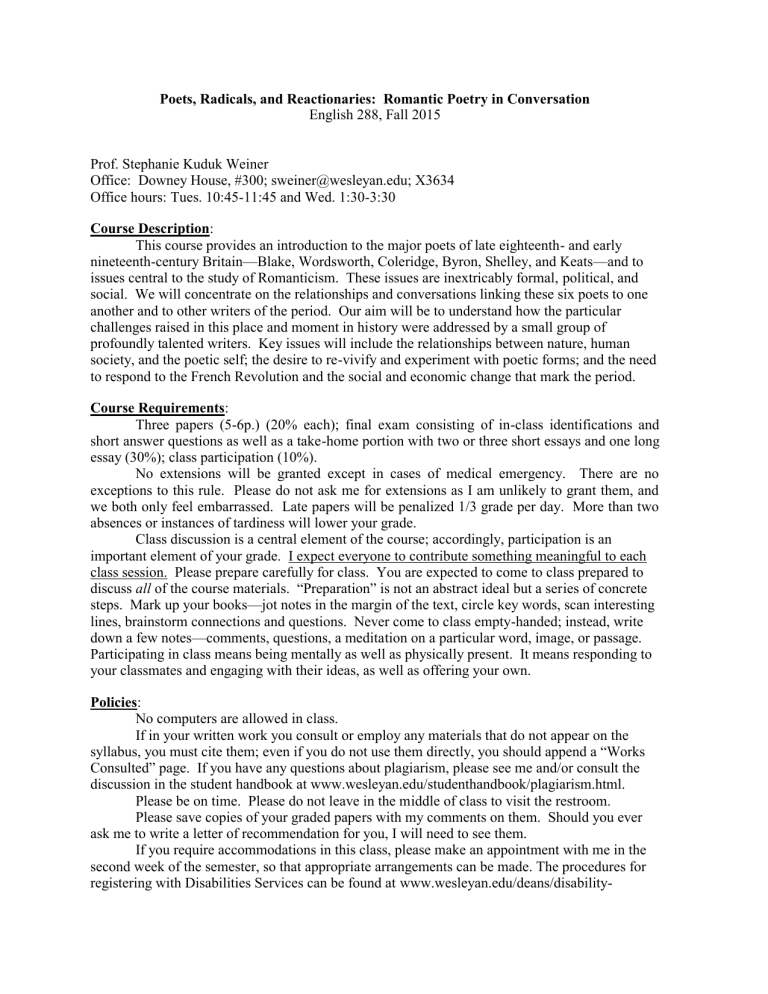
Poets, Radicals, and Reactionaries: Romantic Poetry in Conversation
English 288, Fall 2015
Prof. Stephanie Kuduk Weiner
Office: Downey House, #300; sweiner@wesleyan.edu; X3634
Office hours: Tues. 10:45-11:45 and Wed. 1:30-3:30
Course Description :
This course provides an introduction to the major poets of late eighteenth- and early nineteenth-century Britain—Blake, Wordsworth, Coleridge, Byron, Shelley, and Keats—and to issues central to the study of Romanticism. These issues are inextricably formal, political, and social. We will concentrate on the relationships and conversations linking these six poets to one another and to other writers of the period. Our aim will be to understand how the particular challenges raised in this place and moment in history were addressed by a small group of profoundly talented writers. Key issues will include the relationships between nature, human society, and the poetic self; the desire to re-vivify and experiment with poetic forms; and the need to respond to the French Revolution and the social and economic change that mark the period.
Course Requirements :
Three papers (5-6p.) (20% each); final exam consisting of in-class identifications and short answer questions as well as a take-home portion with two or three short essays and one long essay (30%); class participation (10%).
No extensions will be granted except in cases of medical emergency. There are no exceptions to this rule. Please do not ask me for extensions as I am unlikely to grant them, and we both only feel embarrassed. Late papers will be penalized 1/3 grade per day. More than two absences or instances of tardiness will lower your grade.
Class discussion is a central element of the course; accordingly, participation is an important element of your grade. I expect everyone to contribute something meaningful to each class session. Please prepare carefully for class. You are expected to come to class prepared to discuss all of the course materials. “Preparation” is not an abstract ideal but a series of concrete steps. Mark up your books—jot notes in the margin of the text, circle key words, scan interesting lines, brainstorm connections and questions. Never come to class empty-handed; instead, write down a few notes—comments, questions, a meditation on a particular word, image, or passage.
Participating in class means being mentally as well as physically present. It means responding to your classmates and engaging with their ideas, as well as offering your own.
Policies :
No computers are allowed in class.
If in your written work you consult or employ any materials that do not appear on the syllabus, you must cite them; even if you do not use them directly, you should append a “Works
Consulted” page. If you have any questions about plagiarism, please see me and/or consult the discussion in the student handbook at www.wesleyan.edu/studenthandbook/plagiarism.html.
Please be on time. Please do not leave in the middle of class to visit the restroom.
Please save copies of your graded papers with my comments on them. Should you ever ask me to write a letter of recommendation for you, I will need to see them.
If you require accommodations in this class, please make an appointment with me in the second week of the semester, so that appropriate arrangements can be made. The procedures for registering with Disabilities Services can be found at www.wesleyan.edu/deans/disability-
students.html. p. 2
p. 3
Course Outline:
Tu. 9/8: Course introductions: Who, when, and what is “Romanticism”?
Skim the “Literary Terminology” appendix in the Norton Anthology
Th. 9/10: Blake introduction—always read the author and text introductions!
Blake, “All Religions Are One,” (1788), “There is no Natural Religion” [a] and
[b] (1788), and Songs of Innocence (1789). Read all of the Innocence poems, and then re-read and focus on “Introduction,” “The Ecchoing Green,” and
“Laughing Song”
Tu. 9/15: Blake, Songs of Experience (1794). Read all of Experience, and then re-read and focus on “Introduction,” “The Chimney Sweeper,” “The Little Vagabond,”
“Holy Thursday,” and “London”
Burns introduction, “Song—For a’ that and a’ that—” (1795), “To a Mouse”
(1786)
Th. 9/17: Blake, Songs of Innocence and of Experience. Re-read the entire volume again, focusing on “The Lamb,” “The Divine Image,” and “On Anothers Sorrow” in
Innocence and “The Tyger,” “My Pretty Rose Tree,” “Ah! Sun-Flower,” “The
Lilly,” and “The Human Abstract” in Experience
Tu. 9/22: Blake, “The Marriage of Heaven and Hell” (1790-1793), “A Song of Liberty”
(1790), and [Two Letters on Sight and Vision]. Read the whole poem, then reread and focus on plates 3-4, 12-14, and 17-20
Blake, from “A Vision of the Last Judgment” (1810) (moodle)
Th. 9/24: Re-read “The Marriage of Heaven and Hell”, focusing on “Proverbs of Hell” and plates 11, 16-17, 21-24
Thompson, “Works or Faith” (moodle)
Mon. 9/28: ESSAY ONE DUE at 11:00 a.m. in my box in Downey House or via email
Tu. 9/29:
Burns, “Tam O’Shanter” (1786).
Wordsworth introduction, “Simon Lee” (1798), “Resolution and Independence”
(1807), “The Solitary Reaper” (1807), and [The Subject and Language of
Poetry] from the “Preface” to Lyrical Ballads (1798, 1800, 1802)
Coleridge, read the first few pages of “Rime of the Ancient Mariner” (1798,
1816)
Th. 10/1:
Coleridge introduction, “Rime of the Ancient Mariner” and the following prose selections: [Occasion of the Lyrical Ballads ] from Biographia Literaria, [Fancy and Imagination in Shakespeare’s Poetry] from Lectures on Shakespeare, [On
Symbol and Allegory] from The Statesman’s Manual, “Difference between
Stories of Dreams and Ghosts” from Specimens of the Table Talk of STC
Tu. 10/6:
Coleridge, “Kubla Khan” (1797/1816), [Mechanic vs. Organic Form] from
Lectures on Shakespeare (1812), [On the Imagination] from Biographia
Literaria, “Poetry” from Specimens of the Table Talk of STC
p. 4
Th. 10/8:
Coleridge, “The Eolian Harp” (1795, 1834), “This Lime Tree Bower My Prison”
(1797/1800), and “The Nightingale: A Conversation Poem” (1798) (moodle)
Tu. 10/13: Coleridge, “Frost at Midnight” (1798), “Dejection: An Ode” (1802)
Th. 10/15:
Wordsworth, “Lines Composed a Few Miles above Tintern Abbey” (1798),
“Ode: Intimations of Immortality” (1802-4/1807), and [“What Is a Poet?”] and
[“Emotion Recollected in Tranquillity”] from the “Preface” to Lyrical Ballads
Coleridge, [Mr Wordsworth’s Earlier Poems] from Biographia Literaria,
“Materialism” from Specimens of the Table Talk of STC
Tu. 10/20: Wordsworth, from The Prelude (1805/1850): Book First, l. 1-141, 272-501, 571end; Book Second, lines 145-202, 303-end. (Read the left-hand side of the page, i.e. 1805, consulting the 1850 text as you see fit. The 1805 line numbers are given on the right margin of the page; those in brackets on the left refer to the
1850 text.)
Th. 10/22: The Prelude: Book Sixth, l. 426-572; Book Eleventh, l. 255-end.
Th. 10/29: The Prelude: Book Ninth, l. 40-125; Book Tenth, l. 1-439, 657-940
Coleridge, “To William Wordsworth”
Tu. 11/3: The Prelude: Book Twelfth, l. 1-111, 278-312, 354-379; Book Thirteenth, l. 1-
184, 211-287, 428-end.
Th. 11/5: Wordsworth, “I Wandered Lonely as a Cloud,” “My heart leaps up,”
“Composed Upon Westminster Bridge,” “It is a beauteous evening,” “London,
1802,” “The world is too much with us,” (all 1802-4/1807), “Surprised by joy”
(1815), “Mutability” (1822), “Steamboats, Viaducts, and Railways” (1835)
Dorothy Wordsworth, from Alfoxden Journal (written 1798) and Grasmere
Journals (written 1802)
Mon. 11/9: ESSAY TWO DUE at 11:00 a.m. in my box in Downey House or via email
Tu. 11/10: Byron, introduction; from Childe Harold’s Pilgrimage Canto 1 (1812), Canto 3
(1816)
Th. 11/12: Keats, “On First Looking into Chapman’s Homer” (1817), from “Sleep and
Poetry” (1817), “On Seeing the Elgin Marbles” (1817), from Endymion (1818),
“On Sitting Down to Read King Lear Once Again” (1818/1838), “When I Have
Fears” (1818/1848), “To Homer” (1818/1848), and the following letters: to
Benjamin Bailey (Nov. 22, 1817), to George and Thomas Keats (Dec. 21, 27?,
1817), to Reynolds (Feb. 3, 1818), to Reynolds (May 3, 1818), to Woodhouse
(Oct. 27, 1818)
Tu. 11/17:
Byron, “Darkness” (1816), “Manfred” (1817)
Coleridge, [The Satanic Hero] from The Statesman’s Manual (1816)
p. 5
Th. 11/19:
Keats, “Why did I laugh tonight?” (1819/1848), “Bright Star” (1819/1838), “La
Belle Dame Sans Merci: A Ballad” (1819/1820), “Ode to Psyche” (1819/1820),
“Ode on a Grecian Urn” (1819), and the following letters: to Taylor (Feb. 27,
1818), To George and Georgiana Keats (Feb. 14-May 3, 1819), To Fanny
Brawne (July 25, 1819), To Percy Shelley (Aug. 16, 1820)
Hazlitt, “On Gusto”
Tu. 11/24: Keats, “The Eve of St. Agnes” (1819/1820), “Ode to a Nightingale” (1819),
“Sonnet to Sleep” (1819/1838)
Tu. 12/1: Keats, “Ode on Melancholy” (1819/1820), “Ode on Indolence” (1819/1848),
“To Autumn” (1819/1820), and the letter to Charles Brown (Nov. 30, 1820)
Th. 12/3:
Shelley, from “A Defence of Poetry” (1821/1840), “England in 1819”
(1819/1839), “Ode to the West Wind” (1820), “To a Sky-Lark” (1820)
Mon. 12/7: ESSAY THREE DUE at 11:00 a.m. in my box in Downey House or via email
Tu. 12/8: Byron, from Don Juan Cantos I-II (1819)
Th. 12/10: Don Juan, Cantos III-IV (1821) (moodle)
FINAL EXAM: hand in take-home portion, take in-class section at scheduled examination time period.
